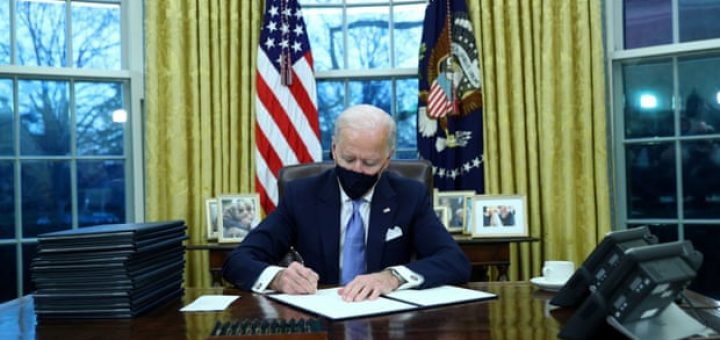Executive orders will end travel ban and expand census as new president seeks path to citizenship for undocumented migrants.
Hours after being sworn in as president, Joe Biden reversed several Donald Trump immigration policies by executive action, marking a stark change in tone from the previous four years of anti-immigrant rhetoric and actions.
The president had a slate of immigration actions planned for his first day in office, including the unveiling of an immigration reform bill, which provides a pathway to citizenship for undocumented people.
On Wednesday at the White House, Biden used executive actions to roll back Trump’s attempt to exclude undocumented people from the census, end his travel ban, roll back his policy that eliminated deportation priorities and ended an emergency declaration the former president used to divert funds to the wall on the US-Mexico border.
Biden also issued a presidential memo to underline the administration’s support for the Deferred Action for Childhood Arrivals (Daca) program, which allows people who were brought to the US as children without legal documents to temporarily get work visas and be protected from deportation. Trump ended Daca in 2017, but the decision was embroiled in legal challenges and eventually rejected by the supreme court.
In another memo, Biden extended a program that protected roughly 4,000 Liberians in the US who hold a protected immigration status known as Deferred Enforced Departure (DED).
Leaders of some of the nation’s most prominent immigration advocacy groups celebrated the Biden administration’s first actions on the issue. The deputy director of the National Immigration Law Center, Kamal Essaheb, said: “Today marks a new day for our country.”
Among the measures Biden signed Wednesday was an executive order which reverses an order Trump signed five days after he took office that dramatically expanded interior immigration law enforcement by no longer prioritizing the deportation of criminals. The Trump order effectively made any of the 10.5 million undocumented people in the US a deportation priority – including families, longtime residents and Dreamers – those protected by Daca.
Biden also ended the travel ban, which Trump announced in his first week in office, by executive action. Biden’s action instructs the state department to restart visa processing for the affected countries and to develop a proposal to remedy harms caused by the bans, including those who had visas denied. It also allows for increased screening and vetting of travelers through information sharing with foreign governments.
In a call with reporters on Tuesday, the incoming administration emphasized its plans to address the root causes of migration, including by sending aid to the Central American countries where the climate crisis, violence, corruption and poverty have driven an increase in family immigration.
Jake Sullivan, Biden’s incoming national security adviser, said: “The Biden administration is going to have a very different approach to regional migration than what we’ve seen over the last four years, with a special emphasis rooted in years of the president-elect’s commitment to addressing the root causes of migration in the region.”
Separately, the officials said, Biden will send an immigration bill to Congress on Wednesday, after taking office.
The US Citizenship Act of 2021 would allow undocumented immigrants to apply for temporary legal status, and give them the ability to apply for green cards after five years if they pass background checks and pay their taxes. Dreamers, temporary protected status (TPS) holders and immigrant farm workers who meet specific requirements would be eligible for green cards immediately under the legislation. After three years, these green card holders could apply for citizenship.
Most Americans support a pathway to citizenship for undocumented immigrants, two-thirds of whom have lived in the US for more than 10 years. A New York Times/Siena College poll in September showed 68% of voters supported a pathway to citizenship.
To deter people from rushing to the border, applicants must be physically present in the US on or before 1 January 2021. The legislation would, however, allow the homeland security secretary to waive the presence requirement for those deported since Trump took office and had been in the US three years prior.
The act would also change immigration laws to use the word “noncitizen” instead of “alien”, increase the number of diversity visas from 55,000 to 80,000 and eliminate the three- and 10-year bans that prevent people from re-entering the US if they have left the country after being there illegally, among other actions.
The executive director of the advocacy group United We Dream, Greisa Martinez Rosas, called it the “most progressive immigration bill in history” and said activists would work to ensure the bill was not simply a message, but something that was acted on.
Comprehensive immigration reform has been elusive for decades. The last significant attempt in 2013 failed in the Republican-controlled House.
To pass the legislation, Biden would probably have to persuade 60 senators, including at least 10 Republicans, to support the bill.
Susan Rice, who will lead the White House domestic policy council, said: “President Biden’s legislation will modernize our immigration system and prioritize keeping families together, growing our economy responsibly and effectively managing the border with smart investments, addressing the root causes of migration from Central America, and ensuring that the US remains a refuge for those fleeing persecution.”
The Biden administration also plans to build back up US asylum and refugee programs but cautioned it could take months to address Trump administration changes to the systems.
Biden administration officials said future immigration executive actions would include plans to address the migrant protection protocols (MPP), better known as Remain in Mexico, which require asylum seekers to await their court hearings in Mexican border towns and not in the US, as before.
They would also address the Centers for Disease Control and Prevention (CDC) bar on asylum seekers and refugees under an order called Title 42.
More executive actions on immigration are expected on 29 January.
On Tuesday, asylum seekers at the border released a video message for Biden asking his administration to end Title 42, MPP and improve access to asylum. The open letter said: “We would like you to know there are thousands of families in danger and who have been waiting for over a year at the border.”
Source: The DEFENDER/Frankofili.net/TheGuardian




